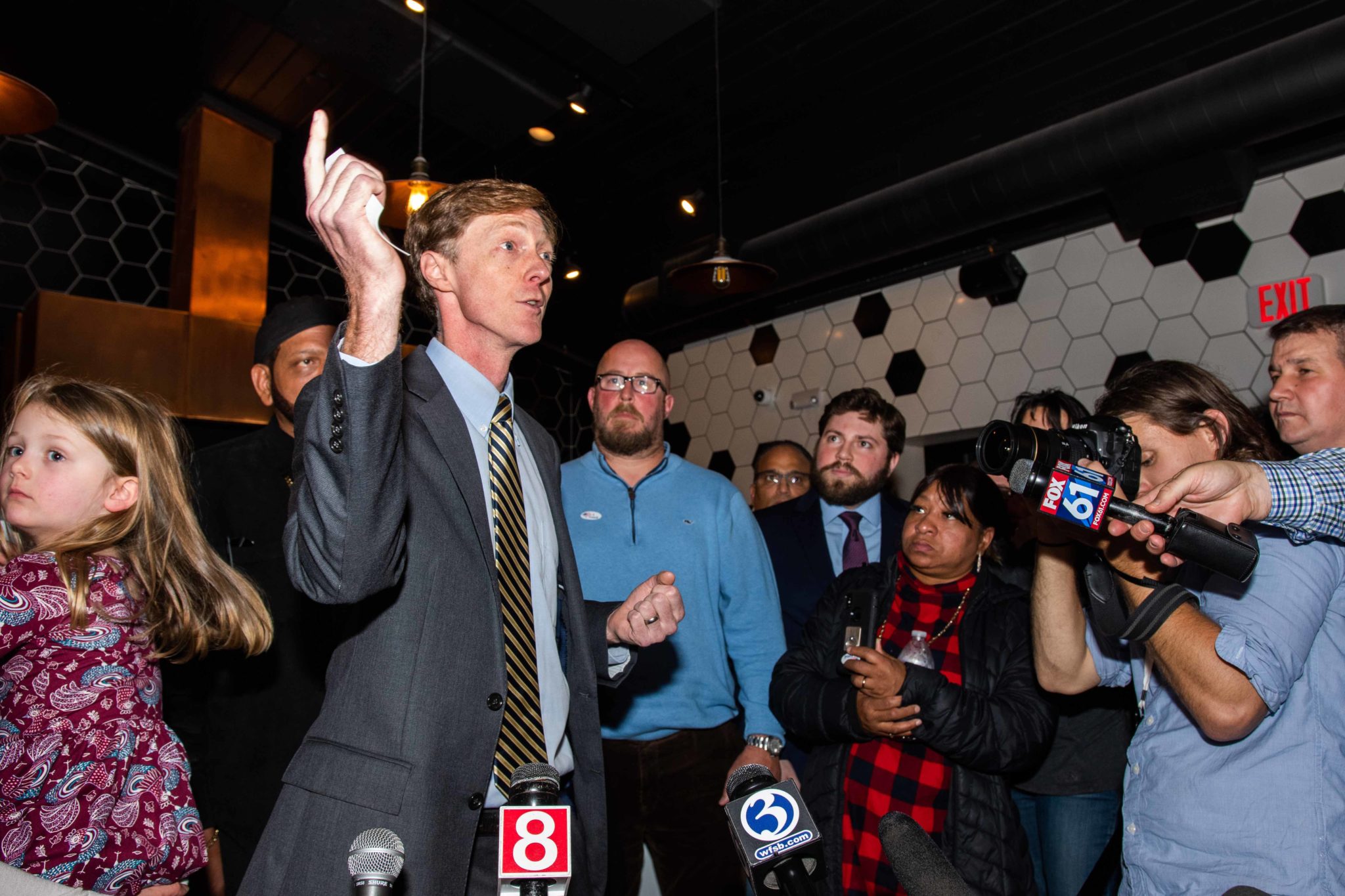
Lukas Flippo
After cruising to victory over three-term Mayor Toni Harp on Tuesday night by a 2-to-1 margin, mayor-elect Justin Elicker SOM ’10 FES ’10 is now faced with the task of demonstrating to his soon-to-be constituents that he will serve all New Haveners while at the helm of City Hall.
The campaign season got off to a tense start with a primary cycle that featured attack ads, fiery debates and personal blows. After Elicker won in a landslide in the Democratic primary, it seemed that Harp and the Elm City were ready to move on. However, Harp ultimately chose to stay in the race as the candidate for the Working Families Party. In the weeks leading up to the general election, negative rhetoric — largely from the grassroots People’s Campaign — only intensified. In the general cycle, Elicker managed to stay out of the mudslinging that characterized the primary, refraining from mentioning Harp on the stump. In his victory speech on Tuesday, he acknowledged the fear driving some of this rhetoric — specifically, that Elicker will serve only certain New Haveners as mayor — and committed to being a mayor for all Elm City residents.
“On my travels around the city today … one African American woman came up to me and said to me, ‘don’t forget about our community,’” Elicker said in his victory speech on Tuesday. “And it made me think that there are some people that were on the other side of this campaign and think that it’s possible I might forget about their community, and that’s particularly so in the African American community.
“When I think about the message of this campaign,” he continued, “it was about including everyone … I care that every single person has access to New Haven government.”
Elicker and Harp first duked it out for the city’s top office in 2013, when the now-mayor-elect lost to Harp in the Democratic primary and again in the general, in which he ran unaffiliated. Harp outperformed him overall and overwhelmingly in minority neighborhoods. Throughout this year’s race, many residents voiced concerns that 2019 would be a repeat of six years ago, with Elicker appearing to cater only to certain communities and failing to address the needs of residents in places like Dixwell and Newhallville, which historically have been bastions of Harp support.
But Elicker’s overwhelming victory — a win in 27 wards and a smaller loss margin than his primary numbers in the remaining three — showed that this time around, he was able to connect with New Haven residents of all backgrounds. His campaign manager, Gage Frank, has consistently emphasized the team’s commitment to visiting every ward and neighborhood. Elicker has also been notably transparent, publicizing his personal cell phone number in an effort to make himself an accessible candidate.
Still, some Elm City residents appear unsure and fearful. Several speakers at a Harp rally on Saturday sounded the alarm about the implications of race in the mayoral contest, likening Harp to Rosa Parks and saying that her holding the position encourages young women of color to aspire to leadership roles ranging from the mayorship to the presidency.
People’s Campaign organizers have several times pointed to a Hartford Courant article decrying the “year of the white man in politics” in Connecticut cities. Rev. Boise Kimber — who spoke on Saturday of a political #MeToo-style assault on Harp, perpetrated by white men — penned a Thursday op-ed in the New Haven Register warning the white takeover of public life should Elicker win.
“While we in the black and brown communities sleep, the takeover of our public institutions has begun,” Kimber wrote. “The appropriation of public institutions isn’t just about taking the reins of power, it is also designed to destroy the previous leaders of those organizations so that they can no longer compete.”
Just before the polls closed on Tuesday night, People’s Campaign leader Emma Jones — who has spent the past two decades organizing against police brutality in the Elm City — told the News that the overwhelming vote for Elicker harkens back to the pre-Civil Rights era, in which, she said, white voters gravitated towards white candidates. The People’s Campaign, she continued, attempted to bridge gaps in New Haven’s black community in the hopes of turning out enough support for a Harp win. Ultimately, the effort failed.
In an interview with the News, Elicker said that his transition team and eventual executive appointments will reflect the diversity of the city while boasting professional expertise. He highlighted that the transition process will be open and public — community members are invited to share their thoughts with him on his website and via other platforms.
Between September’s primary and the general election, Elicker increased his vote share in all wards. He increased his margin of victory in those he won and decreased his margin of loss in the three wards he failed to flip. The most Elicker-favoring ward was Ward 18, which went for the mayor-elect with 86 percent of its vote.
Mackenzie Hawkins | mackenzie.hawkins@yale.edu







